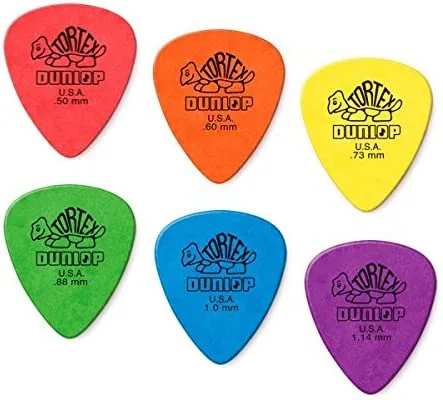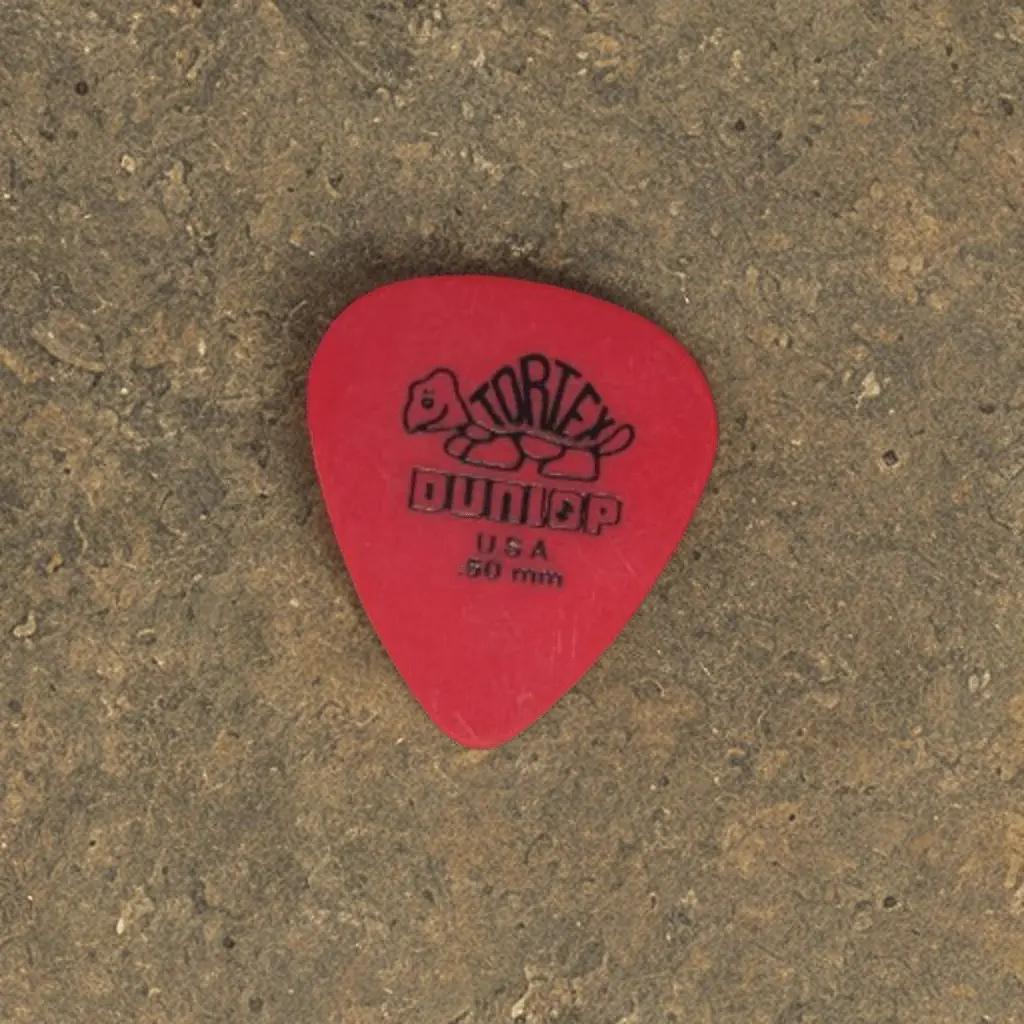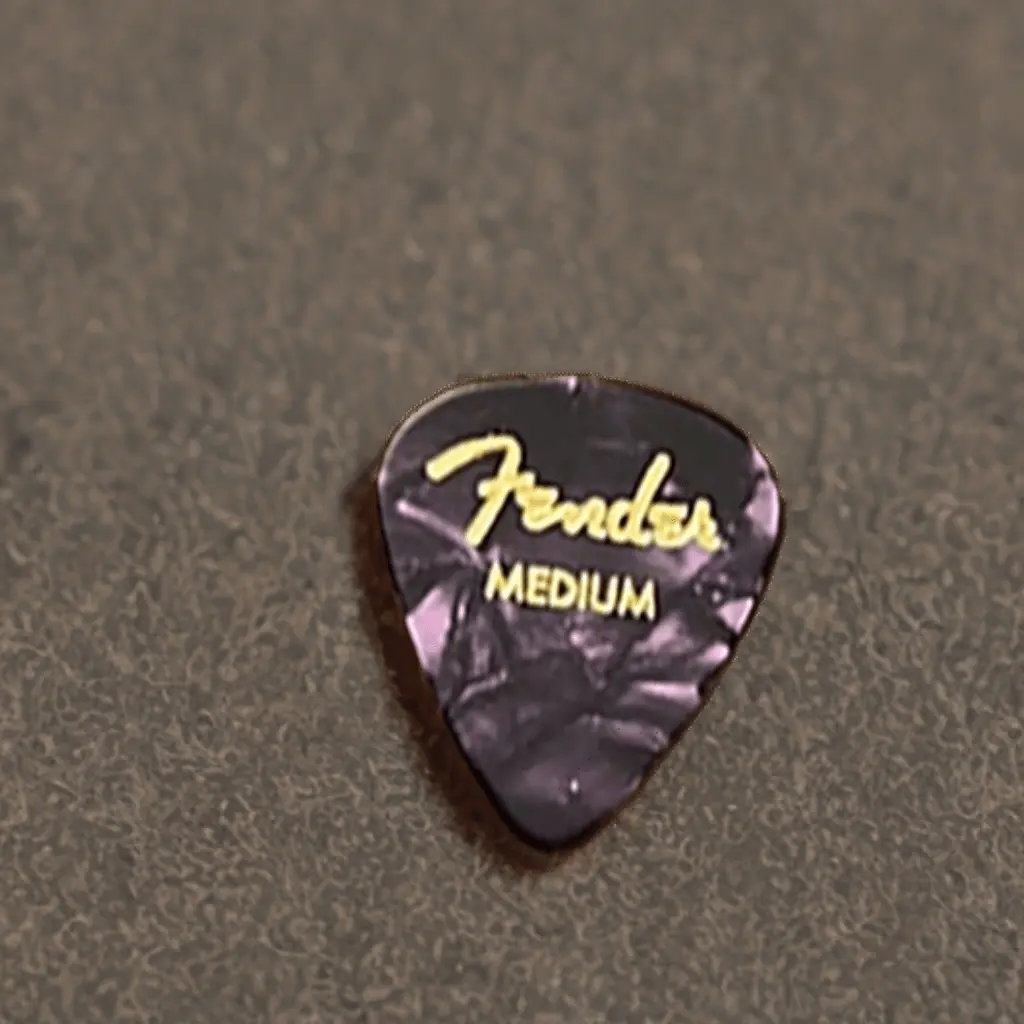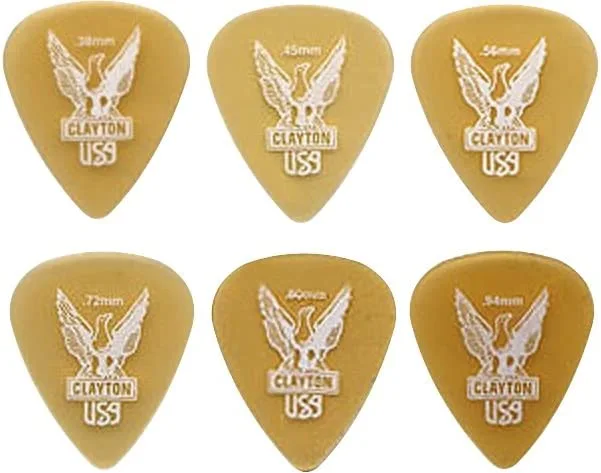
With this review, you’ll find the best acoustic guitar pick for you.
If you are thinking about buying picks for your acoustic guitar, this is the right place. This guide will provide you with the most essential information which will help you make an educated
choice.
As a guitar player, I’ve used my experience and researched in depth which acoustic guitar pick is best for you.
I conclude that the Dunlop Tortex Standard is the best acoustic guitar pick overall.
Also, keep in mind that in order to find the right pick, you’ll have to try different picks and decide which feels and sounds the best for you. Having said that, here is what you should know before you set sail to get a pick.
Let’s get started!
Best acoustic guitar picks brands
The top acoustic guitar picks I recommend are:
- Dunlop Tortex Standard
- Fender Medium 351
- D’Addario Celluloid Medium
- Clayton Ultem Standard
- Ernie Ball Nylon Medium
- Dunlop Nylon 1.14mm
- D’Addario Casein 2.0mm
Short descriptions of each of the picks are discussed below.
Now as you have the correct understanding of what to look for in a guitar pick, here are some acoustic guitar plectrums I recommend.
Dunlop Tortex Standard


A nice pick for percussive playing. The Dunlop Tortex Standard is made of durable plastic. These are quite flexible yet sturdy. These have a grippy rubbery feel to them.
These come in 6 sizes 0.50mm, 0.60mm, 0.73mm, 0.88mm, 1.00mm, and 1.14mm. This allows you to try all of the sizes and discover which one suits you. Personally, I prefer the 0.73 and 0.88mm out of the bunch.
All this said, the picks here are mainly for beginners. Especially if you are into rhythm or lead. If precision is your main focus, then there are other good options, as these are quite large in comparison.
Fender Medium 351


Another great choice would be Fender Medium 351. Made from celluloid, these are flexible, durable, versatile, and affordable. These also have a comfortable grip to them which makes them easier to maneuver. Adding to this, these are quite affordable and widely affordable.
These also come in a variety of thicknesses that you can choose from, one that suits your style. A point to keep in mind, like any other pick, these do wear out with heavy use or aggressive playing styles. Unlike the previous one, these have a smooth surface. Which might be good depending on your personal preference.
Overall, Fender Medium 351 is a solid choice. However, that said, there are other options too.
D’Addario Celluloid Medium

D’Addario Celluloid Medium is also another popular choice. These picks are known for their versatility, comfortable grip, and affordability. Being similar to Fender’s in material and design, these come in different colors. These are quite thick, coming at 0.70mm in thickness.
These are also known to produce a warm and blanched tone that some appreciate. The smooth surface and rounded edges of the pick make it easier, but it might slip from time to time.
Overall, these are quite a nice choice for beginner to intermediate players not so good for heavy or aggressive playing styles as they might wear down quickly.
Clayton Ultem Standard

Resembling real tortoiseshell in sound feel and color, Clayton Ultem Standard, which is made from Ultex, is another popular but different option for you. These come in different sizes 0.56, 0.72 & 0.80mm being the most popular picks. These are really durable, bring out a warm and balanced tone, feel grippy in hands, and are environmentally friendly.
These bring out a clean and crisp tone and are unlikely to fracture. One of the downsides of being the strongest picks on the market is not being as flexible. Which might not suit your playing style.
To sum it up, if you are looking for something unique that sounds brighter, Clayton Ultem is a solid option for you.
Ernie Ball Nylon Medium

Ernie Ball Nylon Medium picks are made of durable, flexible nylon material with a smooth surface that provides an easy-to-hold grip for playing. The medium-sized, teardrop-shaped picks offer easy playability and a full, rich tone. A great choice for playing lead guitar or for creating a more defined, precise sound.
In spite of being smooth, Ernie Ball Nylon picks allow a comfortable grip enabling you to have good control even during fast and intricate playing even if you have sweaty hands. Although I find them producing quite a bright tone, some might differ on that.
Overall, the Ernie Ball Nylon Medium pick is a popular and reliable choice for guitar players of all levels due to its durability and tonal characteristics. Whether you’re just starting out or you’ve been playing for years, these picks are definitely worth trying out.
Dunlop Nylon 1.14mm

Another good option from Dunlop is their Nylon 1.14mm pick. Being a popular alternative to the previously mentioned Dunlop Tortex Standard pick, these are sturdier and have a more solid feel to them. As nylon is stronger than plastic, these can really withstand heavy strumming and picking.
These are not suitable for someone who prefers thinner and more flexible picks. Contrary to the plastic one, the smooth nylon surface might not provide the best grip either.
In summary, the Dunlop Nylon 1.14mm pick is a great alternative, offering a thicker and more solid feel, as well as durability for heavy use.
D’Addario Casein 2.0mm

In contrast to other picks on the market, the D’Addario Casein 2.0mm pick is a different and premium option. Its thickness, which provides a firm feel and can result in a full, rich tone, is one of its main features. In addition, casein is a sustainable and eco-friendly substitute for conventional materials like plastic.
One potential drawback of the D’Addario Casein pick is that it may not be the best choice for guitar players who like more flexibility in their picks, as it may be less forgiving when playing intricate or fast parts. Also, the smooth surface of the Casein material may not be as grippy.
When compared to other picks on the market, the D’Addario Casein pick stands out due to its unique material and thickness. It is a great option for players looking for sustainability and a thicker and more solid pick. However not a good choice for someone who prefers a more flexible and forgiving pick.
How to choose acoustic guitar picks
In spite of their small size getting yourself the right pick is really crucial. The feel and sound depend a lot on the pick you get, as it is the only thing apart from your fingers that connect with the strings. Here are some key factors you should consider before you buy a pick.
Material
The material the pick is made out of plays a vital role in the sound it produces, its durability, and how it feels to the touch. Different materials produce different sounds when they strike the strings of the guitar.
Picks are usually made out of plastic, nylon, wood, and metal. Picks made of plastic make a bright and crisp sound. Nylon picks have a warmer, more mellow tone. Metal picks create a bright and cutting sound, whereas wooden picks produce a warm and woody sound.
The durability of the pick is also dependent on the material of your pick as some materials are more resistant to wear and tear. Depending on how frequently you play and your playing style you should pick a material that can withstand. Or stay prepared to buy more than one pick.
The material can also affect how comfortable the pick feels in your hand. How heavy it feels, its grip, texture, how much it bends, and whether it feels cold or warm to the touch, all of these depend on the material it’s made out of.
It’s also important to note that there are different kinds of woods, metals, plastics, and nylons. So the sound and feel depend on that too.
Thickness
A guitar pick’s thickness should be taken into consideration because it changes both the sound it produces and how it feels in your hand. Thin picks create a more delicate and nuanced tone, whereas thicker picks produce a more aggressive and powerful sound.
Adding to this, thinner picks are better for strumming as they are more flexible and give more rebound going back and forth. Thicker picks are better for precision playing. Like single note lines, shredding, etc.
For a more well-rounded playing style, it would be better if you choose somewhere between thin and thick, anywhere from 0.45mm to 0.80mm.
Shape
Depending on your personal preference, as well as the style of music you play you can choose the shape of picks too. Two of the most common shapes are teardrop shapes and triangle shapes. Each shape can be chosen for its versatility and ease of use.
The shape of the tip of a pick can also play an important role in the sound it produces. Pointed tips provide more accuracy and precision.
Final words
Guitar picks come in a variety of materials, shapes, and thicknesses, each with its own advantages and disadvantages. Each material has its unique tonal characteristics, and you should experiment with different materials to find the ones that suit your playing style and preferences.
Each type of pick we’ve discussed has its pros and cons. All of these come down to personal preferences.
